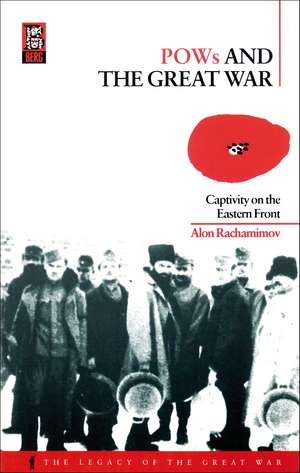POWs and the Great War: Captivity on the Eastern Front: The Legacy of the Great War
Autor Professor Alon Rachamimoven Limba Engleză Paperback – 30 iun 2002
Preț: 230.69 lei
Preț vechi: 281.01 lei
-18% Nou
Puncte Express: 346
Preț estimativ în valută:
44.15€ • 45.92$ • 36.45£
44.15€ • 45.92$ • 36.45£
Carte tipărită la comandă
Livrare economică 15-29 aprilie
Preluare comenzi: 021 569.72.76
Specificații
ISBN-13: 9781859735787
ISBN-10: 1859735789
Pagini: 272
Ilustrații: 20 b&w illustrations, bibliography, index
Dimensiuni: 138 x 216 x 13 mm
Greutate: 0.34 kg
Ediția:New.
Editura: Bloomsbury Publishing
Colecția Berg Publishers
Seria The Legacy of the Great War
Locul publicării:London, United Kingdom
ISBN-10: 1859735789
Pagini: 272
Ilustrații: 20 b&w illustrations, bibliography, index
Dimensiuni: 138 x 216 x 13 mm
Greutate: 0.34 kg
Ediția:New.
Editura: Bloomsbury Publishing
Colecția Berg Publishers
Seria The Legacy of the Great War
Locul publicării:London, United Kingdom
Caracteristici
The first book to consider in depth the experiences of POWS on the Eastern Front during their period of incarceration
Notă biografică
Alon Rachamimov Lecturer in Modern European History,Tel Aviv University, Israel.
Cuprins
List of Figures, Tables and ChartsAcknowledgementsList of AbbreviationsIntroduction1. Clio's Veil2. Historiographic Contexts3. Becoming Prisoners of War4. The Creation of the Austro-Hungarian POW Problem5. Austro-Hungarian POWs in Russia: A Quantitative Overview6. Becoming POWs: The View from Below7. The Hague Convention and the Treatment of POWs: Mission and Omissions8. Prisoner of War Camps in World War I and the 'Barbaric' Twentieth Century9. The Legal Framework10. The 'Prototype' Thesis11. The Treatment of POWs in Russia12. Prisoner of War Camps and other Places of Internment13. Living Conditions in POW Camps14. Prisoners of War as Labor15. Propaganda and Recruitment Among the Prisoners16. The Treatment of POWs and the Perception of World War I17. In Search of the 'Good and Loyal Prisoner': The Austro-Hungarian Censorship and the POWs18. Patriotism in a Multi-National State19. The Austro-Hungarian POW Censorship20. Austro-Hungarian POWs, the Censorship and the Issue of Loyalty21. The Emperor's Clothes: The Austro-Hungarian POW Relief Effort22. POW Relief in World War I: The Uniqueness of the Eastern Front23. The Austro-Hungarian POW Material Relief24. The Austro-Hungarian Nurses25. Imperial Identities and Personal Concerns: The Perspective of the Prisoners26. Repatriation and the Repatriation System (Heimkehrwesen)27. Prisoner of War Letters and their Usefulness as a Historical Source28. The Relief Effort: The Prisoners' Perspective Epilogue: Captivity in the Collective Remembrance of the Great War @ The Emergence of a Commemorative Pecking OrderBibliographyIndex
Recenzii
Based on several years of research in Austrian, German, and Russian archives, this book brilliantly analyzes the problems, suffering and occasional joys of millions of Germans, Austrians, Hungarians, Czechs, Poles, and other nationalities whom World War I thrust as prisoners of war into Siberia. Alon Rachamimov shows, contrary to earlier historians, that the ethnic hatreds that characterized East Central Europe in the interwar period did not originate from the POW camps; rather, the prisoners got along better with one another than the tsarist authorities would have liked.
Covers new ground and has very suggestive things to say about the way prisoners of war become forgotten people in the narratives constructed after the war by soldiers themselves. It is also valuable in adding to the as yet thin literature on the war on the Eastern Front, and to an understanding of the cultural life of prisoners.
Covers new ground and has very suggestive things to say about the way prisoners of war become forgotten people in the narratives constructed after the war by soldiers themselves. It is also valuable in adding to the as yet thin literature on the war on the Eastern Front, and to an understanding of the cultural life of prisoners.




























